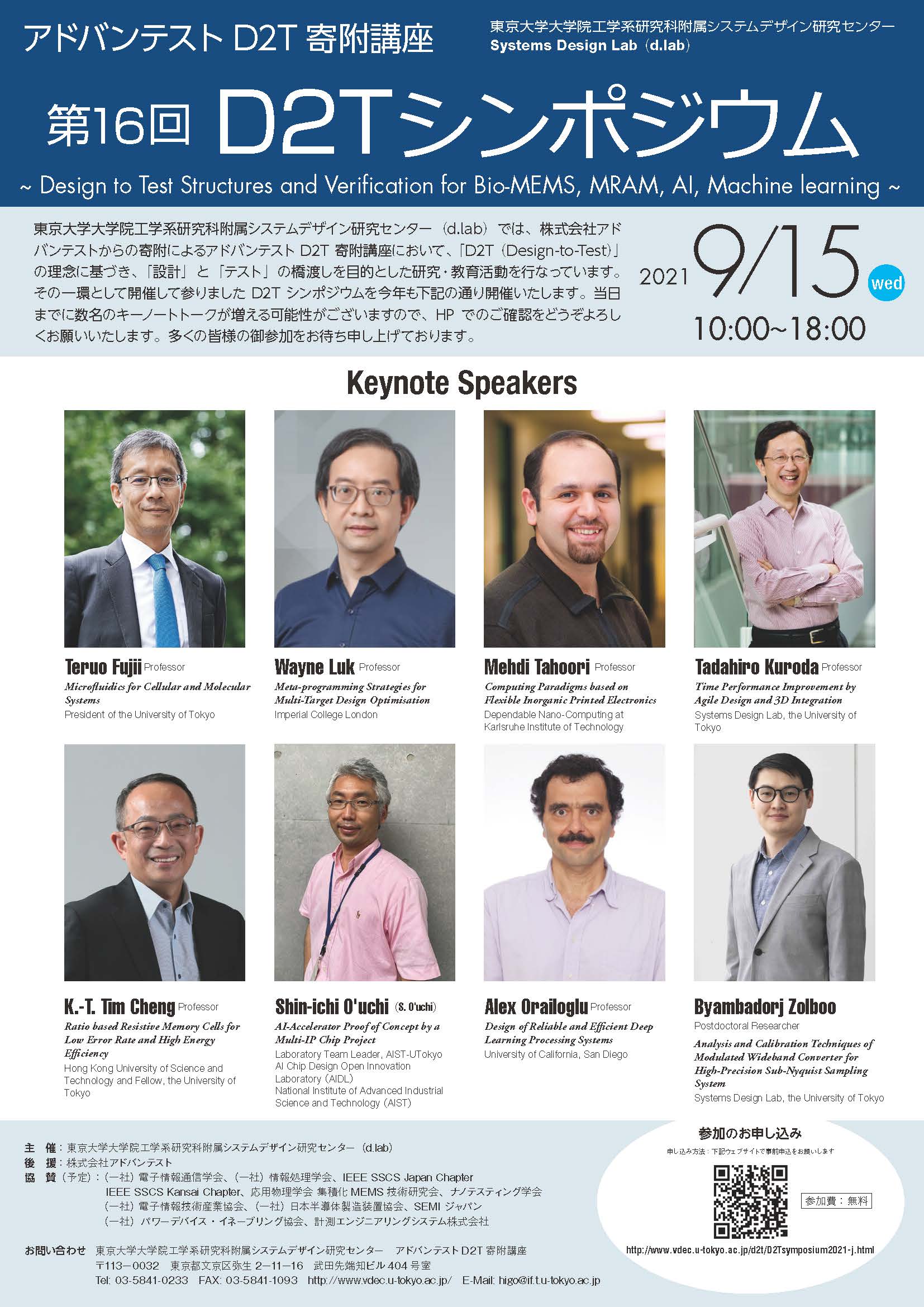東京大学 第16回 D2Tシンポジウム
2021年9月15日(水)
午前10時~午後6時
オンライン開催@zoom
更新情報:
・シンポジウムのホームページを開設しました。(2021/7/16)
・参加申し込みを開始しました。(2021/7/30)
・ありがとうございました。(2021/9/15)
-->
主催 |
東京大学大学院工学系研究科附属システムデザイン研究センター (d.lab) |
英語。英日同時通訳あり。
主催者より:
東京大学大学院工学系研究科附属システムデザイン研究センター(d.lab)は、2019年10月に大規模集積システム設計教育研究センターの改組により発足しました。また、同時に株式会社アドバンテストによるご厚意により「アドバンテストD2T寄附研究部門」は「アドバンテストD2T寄附講座」になりました。
"D2T (Design-to-Test)"の理念に基づき、「設計」と「テスト」の橋渡しを目的とした研究・教育活動を行なっています。
その一環として開催して参りました「D2Tシンポジウム」の第16回目の開催を下記の通りご案内申し上げます。
今回のシンポジウムでは、国内外から著名な招待講演者としてインペリアルカレッジロンドンのWayne Luk教授、米国カリフォルニア大学サンディエゴ校のAlex Orailoglu教授、香港科技大学および本学フェローのK-T. Tim Cheng教授、産業技術総合研究所の大内真一様、東京大学生産技術研究所の藤井輝夫教授、システムデザイン研究センターセンター長の黒田忠広教授をお招きし、最新の研究についての貴重な講演を頂く予定です。
また、D2T寄附講座からは博士研究員のDr.Zolbooによる研究報告がございます。
皆様のご参加を心よりお待ち申し上げております。
タイムテーブル (英語版, English version)
10:00 |
Opening remarks |
東京大学大学院工学系研究科システムデザイン研究センター(d.lab) センター長 黒田 忠広 教授
|
|
10:15 - 11:55 |
Session 1 - Special Lecture I
|
"Microfluidics for Cellular and Molecular Systems"
|
|
10 min break |
|
"Meta-programming Strategies for Multi-Target Design Optimisation"
|
|
11:55 - 13:00 |
Lunch Break |
13:00 - 14:30 |
Sesson 2 - Sepecial Lecture II
|
"Time Performance Improvement by Agile Design and 3D Integration"
|
|
"Design of Reliable and Efficient Deep Learning Processing Systems"
|
|
14:30 - 14:45 |
15 min break |
14:45 - 16:15 |
Session 3 - Special Lecture III
|
"Ratio based Resistive Memory Cells for Low Error Rate and High Energy Efficiency"
|
|
"AI-Accelerator Proof of Concept by a Multi-IP Chip Project"
|
|
16:15 - 16:30 |
15 min break |
16:30 - |
Sesson 4 - Activities of D2T Research Department and Special Lecture IV
|
"アドバンテストD2T寄附講座の活動報告"
|
|
"Analysis and Calibration Techniques of Modulated Wideband Converter
for High-Precision Sub-Nyquist Sampling System"
|
|
"Computing Paradigms based on Flexible Inorganic Printed Electronics"
|
|
Closing
|
シンポジウム講演アブストラクト(順不同) (英語版, English version)
"Microfluidics for Cellular and Molecular Systems"
|
"Meta-programming Strategies for Multi-Target Design Optimisation"
|
"Time Performance Improvement by Agile Design and 3D Integration"
|
"Ratio based Resistive Memory Cells for Low Error Rate and High Energy Efficiency"
|
"AI-Accelerator Proof of Concept by a Multi-IP Chip Project"
|
"Computing Paradigms based on Flexible Inorganic Printed Electronics"
|
"Design of Reliable and Efficient Deep Learning Processing Systems"
|
"Analysis and Calibration Techniques of Modulated Wideband Converter
for High-Precision Sub-Nyquist Sampling System"
|
"アドバンテストD2T寄附講座の活動報告"
|
参加申込(参加費:無料)
D2T シンポジウムの歴史
お問い合わせ
肥後昭男
東京大学 システムデザイン研究センター アドバンテストD2T寄附講座
〒113-0032 東京都文京区弥生2-11-16 武田先端知ビル404号室
Tel: 03-5841-0233 FAX: 03-5841-1093
E-mail: higo[at]if.t.u-tokyo.ac.jp
Systems Design Lab. (d.lab), School of Engineering, The University of Tokyo
